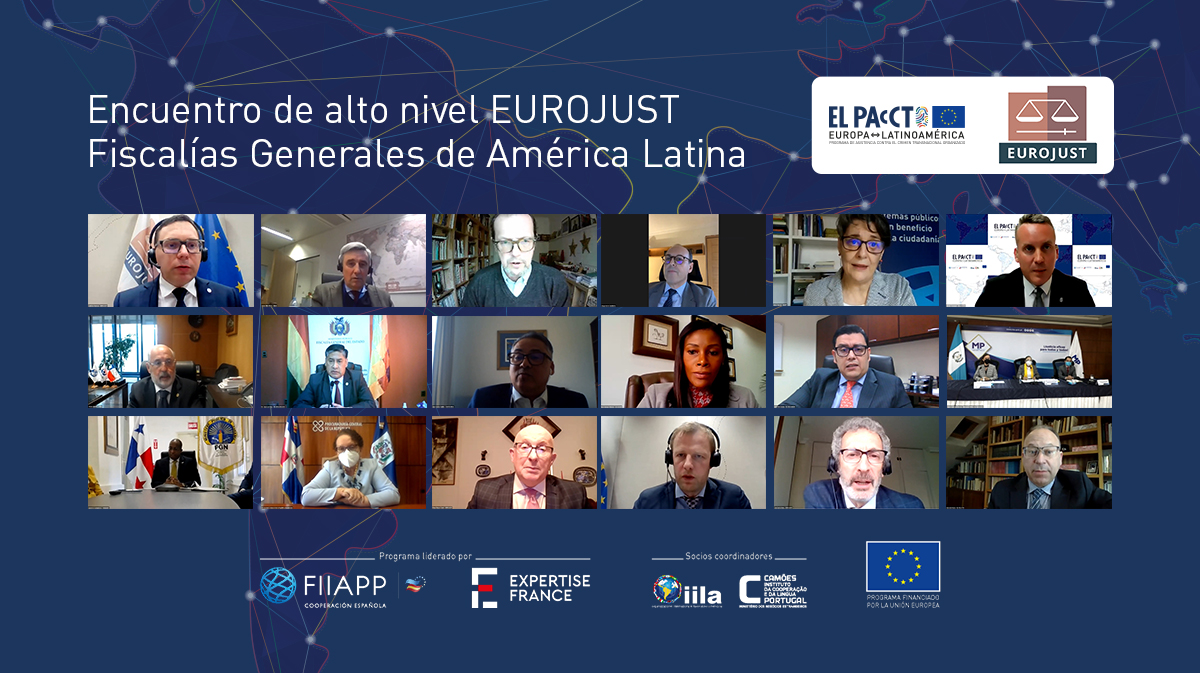This has been agreed during a high-level online meeting of the Europe Latin America Technical Assistance Programme against Transnational Organized Crime (EL PAcCTO) and Eurojust. With a future establishment of contact points in Costa Rica, the Dominican Republic, Ecuador, El Salvador, Guatemala, Honduras and Panamá, Eurojust would be able to count on liaisons with more than 60 partner countries worldwide.
El PAcCTO Director Xavier Cousquer said: ‘One of the primary objectives of the programme is fostering international judicial cooperation and, in this endeavour, building bridges between Latin American countries and the EU is fundamental. In this context, encouraging the setting of formal contacts between Eurojust and various Latin American prosecutor’s offices can be a game-changer for the cooperation between the two regions.’
Eurojust President Mr Ladislav Hamran stated: ‘New contact points in the Latin American region are of great importance to Eurojust and to our partners in the Member States. Criminal networks are increasingly operating across countries and continents, so judicial authorities must do the same. Working together on a global scale means that we are better equipped to tackle major international crime.’
Trust and Team Europe spirit
The meeting was also attended by Javier Niño Pérez, Director for the Americas of the European External Action Service, Peter Csonka, Deputy Director for Criminal Justice of the European Commission’s Directorate-General for Justice, and Jorge de la Caballería, Head of Unit of the European Commission’s Directorate-General for International Partnerships.
Javier Niño stressed the importance of trust between actors in order to be able to work in cooperation with the police, the judiciary and prison systems. The representative of the Directorate General for Justice, Peter Csonka, underlined the need for the exchange of secure data between Eurojust and the countries of Latin America. Finally, Jorge de la Caballería recalled that judicial cooperation is a priority in the fight against organised crime.
The director of the FIIAPP, Anna Terrón, present at the inauguration, highlighted the importance of the EL PAcCTO programme in establishing networks between Latin America and the European Union and the evidence of having a shared agenda.
Enhancing global cooperation is one of Eurojust’s priorities and the Agency has been engaged in an intense dialogue with EL PAcCTO since its inception in 2017, serving as a gateway to all EU jurisdictions. In recent years, contact points had already been established with other PAcCTO partner countries: Argentina, Bolivia, Brazil, Colombia, Peru, Uruguay and most recently Mexico in October 2020.
Participation of eight Latin American Prosecutor’s Offices and Public Prosecutor’s Offices
The President of AIAMP and National Prosecutor of Chile, Jorge Abbot, acknowledged that “it would be beneficial to advance in a framework cooperation agreement between AIAMP and Eurojust through the exchange of experiences and information”.
The meeting was attended by the attorneys general of Bolivia, Costa Rica, Ecuador, the deputy attorney general of El Salvador, the attorney general of Guatemala, the attorney general in charge of Panama and the attorney general of the Dominican Republic. All underlined their commitment to strengthening relations with the European Union through more effective judicial cooperation. Organised crime operates in all states and it is necessary to fight it jointly. In addition, some of the Latin American representatives called for more coordination, specialisation and a fluid exchange of experiences.
What are the Contact Points?
Contact points (CPs) serve as essential first ways for cooperation with competent authorities in third countries and to establish rapid liaisons between judicial authorities when cross-border crime extends beyond the borders of EU Member States. They could also work alongside judicial authorities and participate in coordination meetings.
CPs are usually appointed by general prosecutor’s offices, national courts or the Ministry of Justice in each respective country. They provide support and vital information in international cases, for instance on how to transmit and execute requests for mutual legal assistance or extradition and follow-up on the execution of such requests. The exchange of purely operational information is excluded from this cooperation unless there are specific instruments or procedures in place that enable the transfer of personal data.
The establishment of contact points is often a first step to building further relations with third countries, such as the conclusion of strategic agreements by Eurojust or international agreements by the EU.
Press Release El PAcCTO Eurojust March 2021
